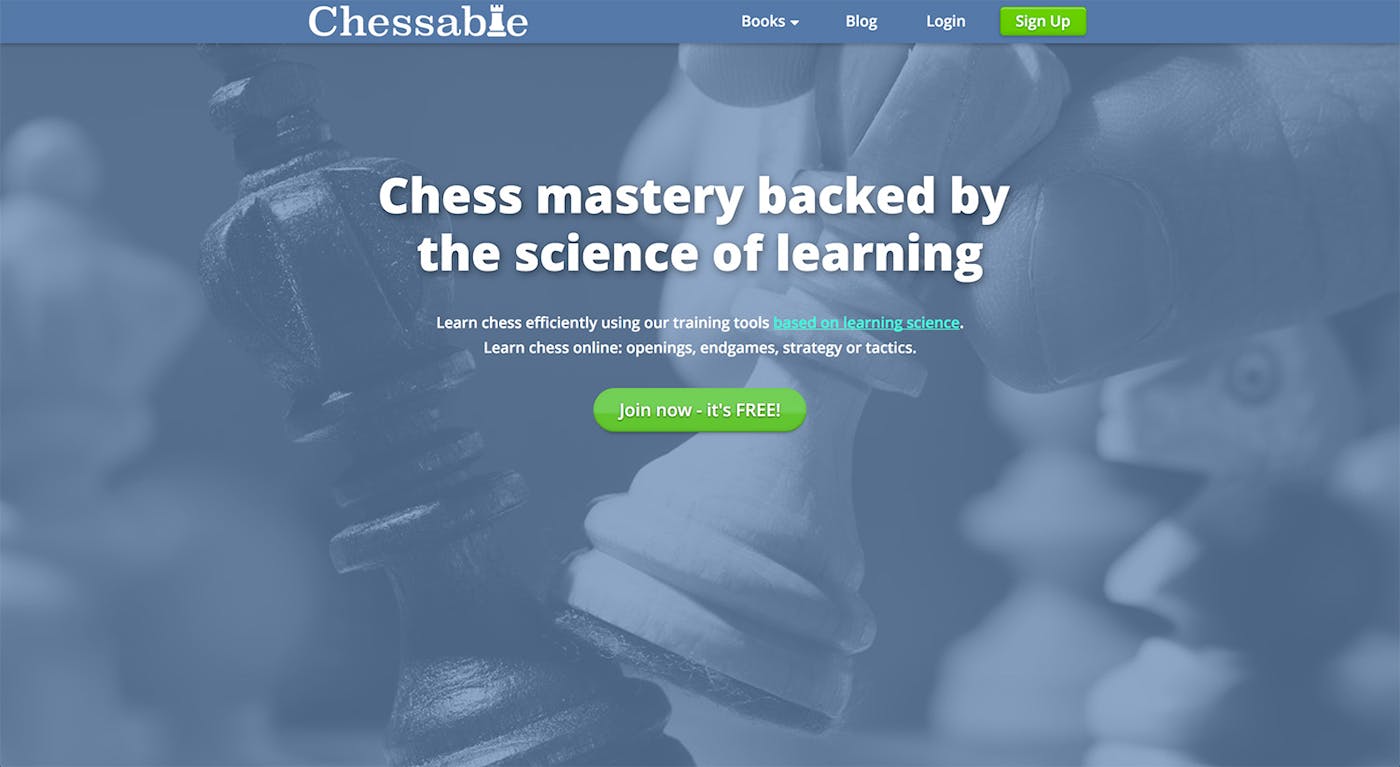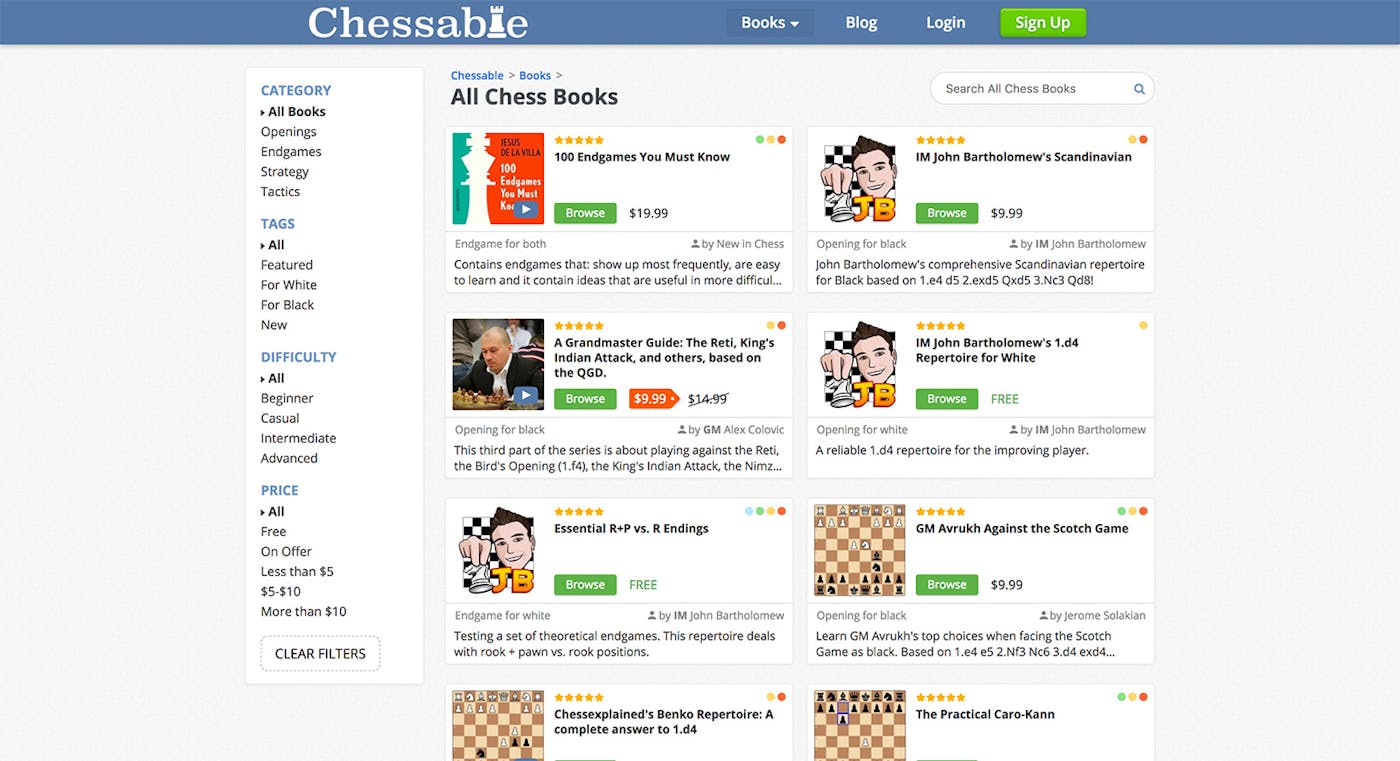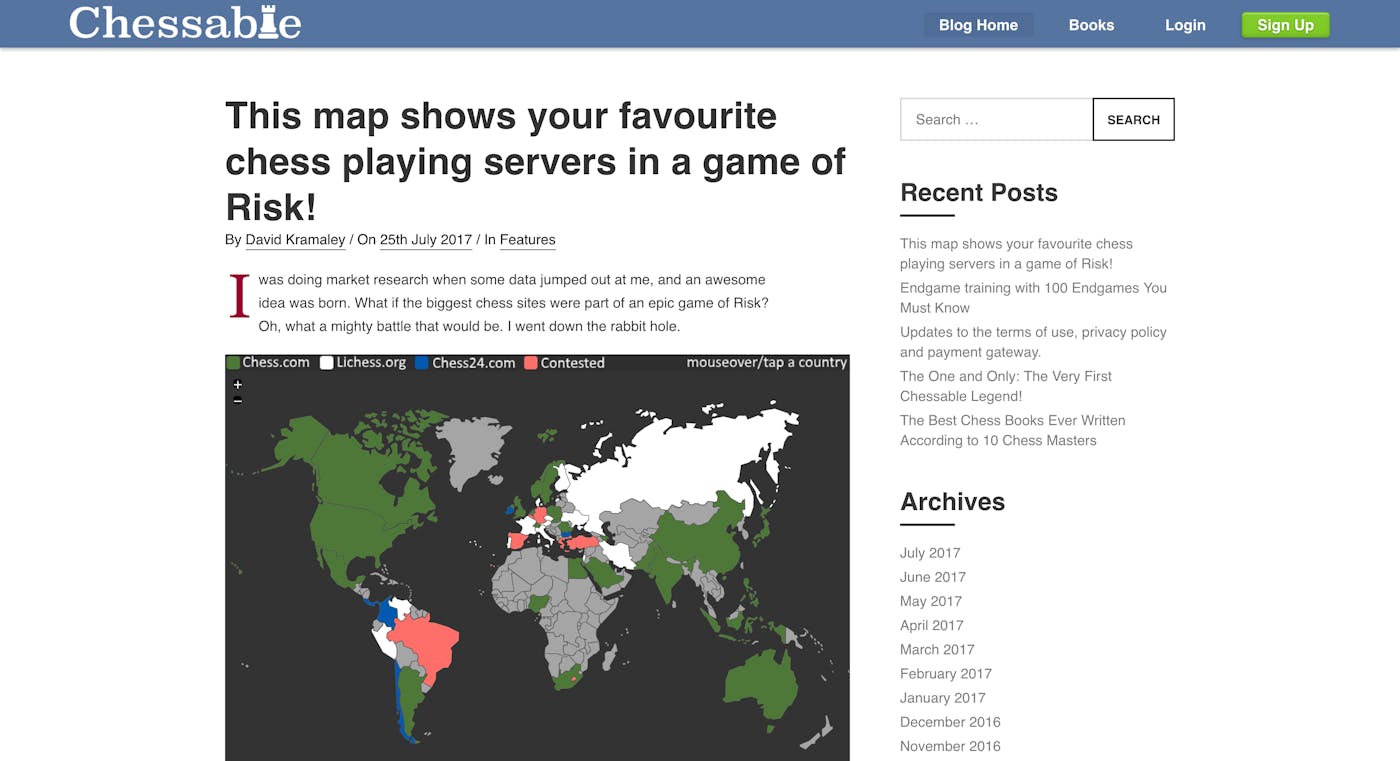Making $6k/mo Taking a Scientific Approach to Chess
Education
Hello! What's your background, and what are you working on?
Hi, my name is David. I'm 29 years old, and I'm one of the co-founders of Chessable.
I live in the UK, but I've been around the world. I spent a large part of my life in New York City, where I completed my undergrad in computer science. Since then I've started up a social games company, and after that I took some time off and a bit of a detour into psychology. It all blends together nicely for Chessable!
Chessable is an online learning platform that changes how players learn the game. Traditionally, you'd have to open up a book and set up a board. It was hard work. You could also watch some videos, but while these techniques can work it's usually really hard to retain the material.
At Chessable we use all the science-based techniques we possibly can, like spaced repetition, to make learning chess easier. Currently, our platform has a lot of content for intermediate and advanced chess players. However, we hope to soon publish content for beginners also.
The platform has been growing steadily and has averaged around $6,000 per month for the last year. In the last two months, we've hit the $10k/mo mark, and with only 21,000 registered users I think our future is very bright.

What motivated you to get started with Chessable?
Honestly, this was a case of solving a problem I had. When my previous startup folded in 2012 I decided to take some time off, travel, read, study, etc. I also got into chess, and being rubbish at it kind of sucked! I worked hard to improve, bought various subscriptions, read some books, solved tactics, and watched many videos. But eventually I plateaued and couldn't improve.
This seemed to be a problem many chess learners (especially adults) had. The consensus online seemed to be that adults struggle way more than the young to learn chess, but I refused to believe this was it.
I quickly hacked up the platform in 2013 and manually imported chess content from various print books I purchased. It made it so much easier to remember things. My chess improved, and eventually in 2015, when my savings were running out and it was time to figure out how to pay the bills, I thought that this chess tool wasn't such a bad business idea after all.
I like the lean startup approach, and to make sure this tool wasn't something affected by my self-serving bias, I reached out to chess coach and up-and-coming YouTuber, IM (international master) John Bartholomew. I watched his YouTube channel when he had around 3,000 subscribers. Today he has 40,000. I briefly told him about my idea and background via e-mail, much as I have done in this interview. He liked it, and we set up a Skype call so he could learn more.
Finally, we met up in person (he'd just happened to have a trip to London on his schedule) and his support was the extra motivation and validation I needed to get this going!
What went into building the initial product?
Everything was guided by the lean startup approach. Here is exactly what we did:
1) Built up a pre-launch mailing list to see if there was interest.
No more than a day's work. 5,000 people gave us their emails. It got to the top of the chess subreddit for a while. We knew we were on the right track.
2) Built an MVP good enough for closed beta.
This took a couple of months of part-time work. I used technologies I was already proficient in, the LAMP stack with JQuery. In hindsight, I wish I had invested a few weeks in updating my tech stack first. This stage was guided by a lot of feedback from my co-founder, John, and a few beta testers.
3) Polished up for open beta.
This took another couple weeks of part-time work. We did not do enough polishing up. We promised a launch in February 2016, and it was nearly March, so there was a lot of pressure to launch.
I'm happier launching a half-done project than seeking perfection and delaying things more and more.
4) Saw if people were willing to pay for it.
This didn't add too much extra time. We simply put in some standard PayPal buttons and charged our users from day one.
This was a key concept I wanted to test straight away. If users were willing to part with their cash, then you know you are onto something. It's almost like the validation concept of all validation concepts.
5) After confirming that all the above had worked out, listened to feedback and kept working hard at it!
This stage took yet another few months. We just kept listening to feedback, fixing things, improving things, writing in the most-requested features, etc.
6) Sought investment.
This was another important step. It took us a long time to achieve — around three months of part-time work followed by four months of full-time work. If investors are willing to back your project, you've reached another step of validation that can accelerate your growth and help relieve some of the pressures that come with bootstrapping.
All in all, the process of developing the product and moving from a closed beta to a seed round took a year and two months.
If at any stage either of these validation concepts failed, the plan was always to keep Chessable as a side project and get a "real" job. My initial part-time commitment was not because I was working elsewhere, but rather because I was completing a master's in the psychology of education. I love psychology, and I also thought this extra education was necessary, as it would perfectly complement my existing knowledge and help squeeze every bit of the science of learning into Chessable.
How have you attracted users and grown Chessable?
Finding the right co-founder was the key here.
I always take an organic approach to growth, using SEO and similar techniques. But this can take ages, so I knew when seeking a co-founder I needed someone who could help with marketing.
When I reached out to John, his YouTube channel had already doubled in size, from 3,000 to 6,000 subscribers, and it looked like this was going to continue. His channel was small enough that I was confident he'd listen to me, but large enough to assure me of its growth and John's value as a co-founder. I had a good feeling that he was the right person to bring attention to the product and get us our early adopters.
Thanks to his involvement and the support from the chess subreddit, we got our first 5,000 users in the first month. Many churned, but the users who stayed helped us develop and improve. I'd highly recommend to tech founders to be proactive and reach out to anyone who they think might make the perfect co-founder. It's one of the best decisions I made for Chessable, and it all started with a single cold e-mail.
As we've grown and more authors have signed up to our platform, referrals and word of mouth have become our biggest source of growth. Other prominent YouTubers like IM Christof Sielecki of Chessexplained and Grandmasters like GM Alex Colovic often mention us. These referral sources are very valuable to us, and we are very grateful to all of our partners who have helped us grow.
To give a brief perspective on our growth, we've gone from jumping the shark in launch week to around 1,300 weekly active users in summer '16, 2,000 in autumn '16, 2,500 in winter '16, a slight dip in spring '17 to 2,300 weekly actives, and finally reaching 3,000-4,000 weekly actives in Summer '17.
| Month | Active Users |
| Summer 2016 | 1300 |
| Autumn 2016 | 2000 |
| Winter 2016 | 2500 |
| Spring 2017 | 2300 |
| Summer 2017 | 3500 |
You can see that organic word-of-mouth and referral growth isn't very fast, but the slow and steady progress is good enough for us. I would highly recommend this strategy to any aspiring entrepreneurs: think about how you can get other people involved. How can you provide a win/win for as many parties as possible? It may be a long time until Google shows you some love!
What's your business model, and how have you grown your revenue?
Our business model has two parts to it. The first part is third-party content publishing, where we've opened up our platform to anyone who'd like to teach using our learning system. We take around 30%-40% commission on sales via this channel, but that's often just enough to cover our expenses (hosting, payment processing, support, Q&A, etc.).
We were gradually able to increase the prices of our content as customers began to trust our new platform, and we brought more and more trusted and known publishers on board. We originally sold digital courses for $2-5, for example, and the price point for some of these books is now around $15-$20.
Because the first part of our business model aimed to give the publisher as much of a share as possible, we also launched a pro subscription model offering certain features only to subscribers.
We dislike putting up pay walls as much as the next company, so we offer a lot for free. And those who buy a book get full access. However, limiting the availability of certain features to subscribers has been the lifeline that's prevented our business from potentially folding.
The pro subscription costs $9.99 per month, or $59.99 per year. We also offer a lifetime package for $299.99.
I'd highly recommend that subscription-based businesses consider lifetime membership options. This was the bankroll that got us off the ground. It has often amounted to 50% of our revenue, and we used the extra money to foot the bill for our crowdfunding campaign and many other essentials.
What are your goals for the future?
We've just taken a popular chess book — 100 Endgames You Must Know by Jesus de la Villa — and re-published it on our platform as a Chessable course. This means that chess players will no longer have to manually copy the content from their favorite books onto a learning platform like Chessable.

We hope to do a lot more of this, as there is a lot of extremely well-written and useful learning material out there already. We want to take all of it and make it easier to learn!
We also want to release more beginner-friendly content. An ultimate ambition of mine is to debunk the 10,000-hour myth and bring it closer to the 1,000-hour mark! Why should anything take 10,000 hours to master? As tech improves, so should education.
What are the biggest challenges you've faced and obstacles you've overcome?
The biggest challenge bootstrapping a startup for me has definitely been money. I wish I'd had more savings when I started this up. I think I had about $15,000 when I started this project, and at least half of that was spent on my master's degree. This wasn't all that fun, and you'll often question whether you should be working on something else. So make sure you have some money saved, especially if you have a family to support, as I do.
On the topic of finance, we also underestimated how hard it would be to raise funding. I think we initially thought we'd be done by October 2016, but we actually didn't have money in the bank until April 2017, seven months later.
Anyone starting a project should really consider how difficult and how long it might take to get funding (or increase revenue enough to self-sustain). We ran two crowdfunding campaigns and spoke to many private investors. And in the end, the crowdfunding failed, but our persistence paid off and we raised from a small group of private angel investors.
In terms of tech, in hindsight I wish I'd kept myself a bit more updated with modern frameworks. I used an old stack, as I was already familiar with it and could get things done quickly with it.
However, in the long run, using a newer framework — something like Backbone.js or AngularJS — might have helped with hiring, code maintenance, and building new features more easily. Instead, we built up purely on JQuery. And now we're slowly adapting, and I'm considering some rewrites to Vue.js.
No regrets though. The most important thing is of course to make things happen. The quest for the perfect stack and technology could be a never-ending story — an excuse not to start. And "updating" your skillset should never get in the way of updating your product.
Have you found anything particularly helpful or advantageous?
I definitely think the lean startup approach has been very advantageous. The constant validation of your idea is incredibly useful. True validation happens when people give you their email address, sign up to your service, and finally when they part with their hard-earned cash. If this doesn't happen sooner rather than later then perhaps you should be doing something else with your time. Always listen to the feedback the market is giving you.
Other than this, I'm a big advocate for being conscientious about how we spend our time, and for building products with ethical design in mind — that is, design that encourages constructive user behavior. We should not only design products that fit this philosophy. We should also remove products that don't.
I hardly spend any time at all on Facebook or other social media, and this helps me be more productive and get things done. Focus and concentration in vast amounts are required to get any new startup off the ground.
What's your advice for indie hackers who are just starting out?
Validate your ideas, listen to feedback, build productive habits, and cut out things that make you less productive.
Most of all, maintain some sort of work-life balance. I often read about the people who spent 20 hours a day for years to make something work. It shouldn't be like that. There are other important things in life, and if you can't make it in a healthy number of hours then perhaps you should seek a different idea, one that will work out and let you explore other life domains — relationships, family, friends, hobbies, etc.
It's fine to have a few crazy weeks and runs, but only if it's the exception rather than the norm.
Where can we go to learn more?
You can find out more about Chessable on our site and our blog:

I also blog (not as often as I should) at my personal site — davidkramaley.com — and I occasionally tweet at twitter.com/simplydt.
Happy to answer any comments or questions anyone may have. Thanks!

Hi, I have spent many hours on your website doing John's 1.d4 Repertoire for White. It works. Thanks.
Thanks for the kind words! Glad to hear it's working well for you too.
How were you able to implement the game-elements? Did you code it yourself as a variant of DuoLingo or is there some kind of plug-in?
Hi, sorry, didn't see this until now. I coded everything myself from scratch. I used to make video (social) games so most of these elements are things I'm very familiar with from years ago. Duolingo also uses them very successfully.
This is very inspiring. Thank you for the interview. How many mailing list signups did you get from your reddit launch? How much of them from your co-founders Youtube? How has your co-founder been able to grow his channel so much? Did you ever meet in person before deciding to work together?
Yes, after a few Skype calls we met in person. This was the final step before embarking on this journey together.
John's Youtube channel success and growth is entirely separate to what we are doing with Chessable, hence I am not entirely qualified to answer about the 'how' he has done it. In my opinion, he is just an awesome video blogger that transmits not only his passion for the game but a tonne of educational content.
Regarding the mailing list, the initial sign ups we got for our mailing list via reddit and John still account for about 15% of our total mailing list signs ups ever, so it was quite a significant boost at the start.
Thanks for the Q!
Very interesting.
Years ago I built a chess application as a University project (using a modified min-max algorithm and some alpha beta pruning - nothing fancy but about as much as Pentium 1-class hardware could take!)
It's a fascinating space.
You've inspired me to revisit my interest in chess ... well at least once I get my own startup off the ground :-)
Cool! Chess is a great game but as you know already, so many possibilities arise that improving is indeed pretty hard work :)
Depending on when you get back into it, we hope to have a full path of progression from beginner to expert. Best of luck with your start up in the meanwhile.
I´m an active chessable user and I'm very happy with the platform. I think having John Bartholomew is a great asset. I think that you deserve a lot more attention from the chess community because it´s a great tool. The design is clean and friendly. One suggestion: I would love to have tactics to save, group and train , and then compare by % success and time spent. Keep the good work
Thanks for the kind words! We are definitely building more and more tools and tactics is high up on our priorities. Maybe you'll see something very soon :). Agree with you, John has been a great co-founder and we enjoy working together very much!